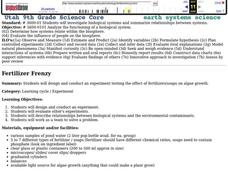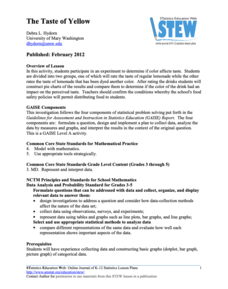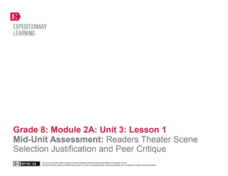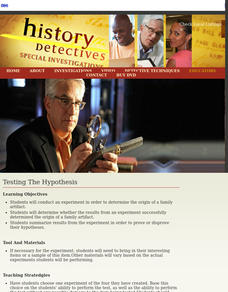Curated OER
Jelly Bracelets: Fashion or Sex Game?
Ever-changing fashion fads are the ideal context for an engaging sociology experiment for adolescents. Through research and conducting a survey, learners draw conclusions about the controversial jelly bracelets fad, banned in some...
Curated OER
Fertilizer Frenzy
Ninth graders design and conduct an experiment. They evaluate other's experiments. Students describe relationships between biological systems and the environmental contaminants. They work as a team to solve a problem.
Curated OER
Conductive Heat Transfer Experiments
Students conduct a variety of experiments to see how heat is transferred using common household objects. The teacher uses the safety plans included in the lesson plan. This is ideal for inexperienced Science teachers.
Mr. E. Science
Thermal Energy and Heat
The presentation covers Fahrenheit, Celsius, and Kelvin scales for temperature as well as conduction, convection, and radiation.
Curated OER
Becoming A Career Detective (Part 1)
Third graders are reminded of the "investigation" of the world of work that they have been conducting since kindergarten. They are asked: "Where have you gathered information about careers?" and Where else might you obtain information?...
EngageNY
Conducting Research: Analyzing a Variety of Sources to Capture Information about My Insect
From picture to words. Scholars analyze a picture of an ant and then list two facts they observed and any questions that may arise. Expert groups from the previous instructional activity then look at a diagram about either an ant or...
EngageNY
Conducting Research: Asking and Answering our Questions about Rainforest Arthropods
Let's ask an expert. Scholars divide into groups to research and become experts on either ants or butterflies. Learners use task cards and text on their topic to complete a note catcher. At the end, they share their information with a...
EngageNY
Conducting a Simulation to Estimate the Probability of an Event II
Add some randomization into simulations. The 11th installment in a series of 25 presents two new methods to use in simulations--colored disks, and random numbers. Pupils use random numbers to run simulations where the probabilities make...
American Statistical Association
The Taste of Yellow
Does lemonade taste better when yellow? A tasty experiment has scholars determine the answer to the question. It requires conducting a taste test with lemonades of different colors (from food coloring), and then collecting and analyzing...
Carolina K-12
Minnesota v. White: Exploring a Judicial Candidate’s First Amendment Rights
After watching a documentary on the Supreme Court case Republican Party of Minnesota v. White, class members research how the First Amendment and free speech issues influence judicial elections and then conduct a mock judicial election.
Teach Engineering
Flame Test: Red, Green, Blue, Violet?
Let the true colors shine through. Pupils conduct a flame test to identify an unknown element. Class members calculate and prepare specific molarity solutions of three chemicals. Using their observations of the colors emitted, they...
EngageNY
Bean Counting
Why do I have to do bean counting if I'm not going to become an accountant? The 24th installment of a 35-part module has the class conducting experiments using beans to collect data. Learners use exponential functions to model this...
Teach Engineering
Ice, Ice, PV!
Knowing the temperature coefficient allows for the calculation of voltage output at any temperature. Groups conduct an experiment to determine the effects of temperature on the power output of a solar panel. The teams alter the...
Theodore Roosevelt Association
Interpreting the Past; Assessing Its Impact on the Present
Even though the presidency of Theodore Roosevelt ended over 100 years ago, we can still learn something from his stances and policies that is applicable today. Class members first look over a list of prevalent political issues from the...
American Psychological Association
Counting Fidgets: Teaching the Complexity of Naturalistic Observation
Why do psychologists conduct experiments in controlled laboratory settings? High schoolers gain an understanding of the importance of controls with an activity that involves naturalistic observations with no imposed controls.
Nuffield Foundation
Going up in Smoke
Don't let all your hard work go up in smoke. Pupils conduct an experiment to see the harmful effects of cigarette smoke. They observe how smoke changes the color of white wool and an indicator solution.
Purdue University
Can You Design a Hot or Cold Pack?
You're getting warmer. Groups conduct an experiment to determine which of four chemicals are in hot/cold packs. They learn about exothermic and endothermic reactions and use this knowledge to design a hot/cold pack that is small enough...
Radford University
The Science of Surveys
To drill or not to drill? An informative unit has scholars first research the advantages and disadvantages of oil drilling in Alaska. They set up and conduct a sample survey to assess attitudes toward oil drilling in a specific...
EngageNY
Mid-Unit Assessment: Readers Theater Scene Selection Justification and Peer Critique
Is it justified? Readers complete the mid-unit assessment to justify their reader's theater scenes and quote choices from To Kill A Mockingbird. After completing the assessment, scholars conduct peer reviews and critique the script...
EngageNY
Research: Paraphrasing Relevant Information
Readers take a look at the source Ethical Style: How Is My T-Shirt Made? and discuss how to say the information in the article without plagiarism. Learners make note of and underline sentences that may present a problem in paraphrasing....
Encyclopedia Britannica
Election Role-Playing Debate
After watching clips of presidential candidates during debates and speeches, and researching the candidate's position on important issues, young researchers conduct a role-play debate in which they act as one of the candidates.
Museum of Science
Slime
Let knowledge of polymers and slime ooze into one's brain. Scholars learn about polymers and cross-linking by conducting a fun hands-on activity. They create their own colorful slime by mixing a borax solution and a glue solution.
PBS
Testing The Hypothesis
After choosing one experiment from the four they conducted in the previous lesson, young investigators analyze the evidence they collected to determine if it proves or disproves their original hypothesis.
Prindle Institute for Ethics
My Dream of Martin Luther King
Conduct a book study of the story, My Dream of Martin Luther King by Faith Ringgold. Followng a read-aloud, scholars take part in philosophical discussions covering the topics of freedom, equality, race, and heroes.
Other popular searches
- Thermal Conductivity
- Conductivity of Metals
- Conductivity Meter
- Metals Conductivity
- Heat Conductivity
- Conductivity of Electricity
- Electric Conductivity
- Metals Property Conductivity
- Ionic Conductivity
- Conductivity and Insulation
- Electrical Conductivity
- Metals Alloys Conductivity

























